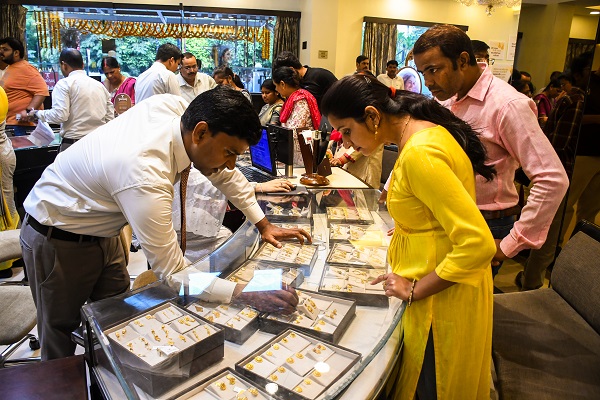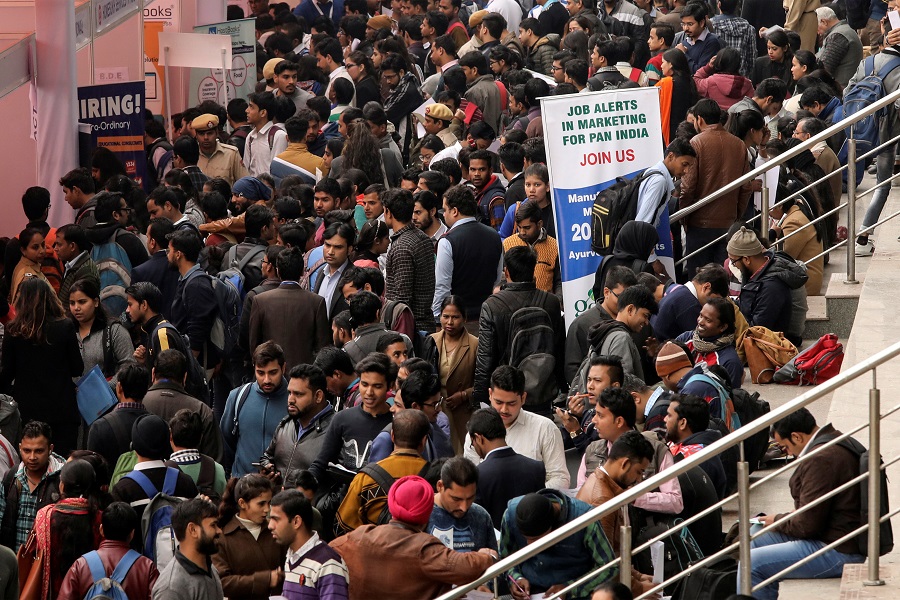Protean eGov Technologies coming with IPO to raise upto Rs 490.33 crore

Protean eGov Technologies
- Protean eGov Technologies is coming out with a 100% book building; initial public offering (IPO) of 61,91,000 shares of Rs 10 each in a price band Rs 752-792 per equity share.
- Not more than 50% of the issue will be allocated to Qualified Institutional Buyers (QIBs), including 5% to the mutual funds. Further, not less than 15% of the issue will be available for the non-institutional bidders and the remaining 35% for the retail investors.
- The issue will open for subscription on November 6, 2023 and will close on November 8, 2023.
- The shares will be listed on BSE as well as NSE.
- The face value of the share is Rs 10 and is priced 75.20 times of its face value on the lower side and 79.20 times on the higher side.
- Book running lead managers to the issue are ICICI Securities, Equirus Capital, IIFL Securities and Nomura Financial Advisory and Securities (India).
- Compliance Officer for the issue is Maulesh Kantharia.
Profile of the company
The company is one of the key IT-enabled solutions companies in India engaged in conceptualizing, developing and executing nationally critical and population scale greenfield technology solutions. It collaborates with the government and has extensive experience in creating digital public infrastructure and developing innovative citizen-centric e-governance solutions. It was originally setup as a depository in 1995 and created a systemically important national infrastructure for capital market development in India. It has been the chief architect and implementer for some of the most critical and large scale technology infrastructure projects in India. Its solutions have led to identification of bottlenecks in government services, increased transparency and efficiency, redefined delivery of public services and led to a reduction in service delivery costs. It was among the leading Indian companies in the e-governance sector in terms of profitability, operating income, operating profit and operating profit margin in Fiscal 2023. It is a professionally managed company and is led by an experienced senior management team whose expertise and industry experience have helped it grow its operations and innovate its services.
The company has over the years successfully adapted to technology advancements through continuous investments in new technologies and capabilities and by developing sophisticated technology architecture. It has domain knowledge for various industries that allows it to develop functionalities that address specific requirements of end-users, businesses and public entities. While executing large and complex projects, it leverages its comprehensive program management expertise. Its clients benefit from its delivery model, significant experience across various technologies, industry knowledge, project management expertise and proprietary software engineering tools developed in-house.
The company has embraced an impact weighted framework to guide all business decisions with a focus on Environment, Social and Governance (ESG) framework and committed to build a value system guiding it to contribute towards a sustainable and responsible future. It understands its responsibility towards the society at large and therefore, its business model focuses on the foundation of social capitalism. It is also cognizant of other important sustainability aspects and endeavour to continuously enhance its operations towards factors influencing ESG. An independent agency has been conducting comprehensive impact diagnostic assessment on an independent basis in the past few years and it has taken all reasonable efforts to incorporate their audit findings into its strategic planning process. The assessment by an independent agency helps it identify opportunities to improve further towards global and national sustainability goals.
Proceed is being used for:
- Achieving the benefits of listing the Equity Shares on the Stock Exchange.
- Carry out the offer for Sale of Equity Shares.
Industry Overview
Over the last one decade there has been a transformation in the way commerce has been carried out. In present era online purchases are experiencing strong growth owing to rising income level, rising number of smartphone users, change in lifestyle and preferences, and improved logistics services. Advancement in IT infrastructure has been the backbone supporting robust growth in e-commerce. However, the e-commerce industry is still under growth phase and certain concerns which exist in the current scenario such as malpractices followed by players, barriers in launching new products, and limited reach to audience need to be addressed. Open Network for Digital Commerce (ONDC) is one such solution government is planning to implement to make the overall e-commerce market more efficient and inclusive. The ONDC is a digital project of the government to redefine the e-commerce landscape in the wake of a large number of complaints of malpractices by e-commerce companies. To standardise the process of on-boarding retailers on e-marketplaces and supply and delivery of products through online channels, the Department for Promotion of Industry and Internal Trade (DPIIT) plans to develop ONDC to set protocols. The protocol for digital commerce would be similar to what UPI is for online payments or what HTTP is for communication over the internet. These will be open standards and the effort is to create protocols for digital e-commerce for creating an enabling e-commerce ecosystem.
India is rapidly becoming more urban and will witness a staggering increase in urban mobility demand soon. The increasing urban population continues to add stress on the infrastructure, environment, and economy of cities. Public mass-transit systems today find themselves competing not just with personal vehicles, but also with new forms of shared mobility. Private shared mobility is continuously evolving in form and scale. But despite the increase in available choices, personal vehicles remain the primary mode of transport for many. The networks of public and private shared mobility operators do not seem to offer a compelling alternative for city travellers. While public transport, especially the rail systems and buses on dedicated lanes, seems to cover the distance faster, its accessibility and availability is a challenge in many cities. Private shared mobility networks, on the other hand, do not always cater to all customer segments. Mobility systems and other travel options in cities thus remain isolated, offering no effective solutions for a seamless door-to-door journey. Big shifts happening in electrification, autonomous and connected vehicle technologies could expand the gap between shared mobility operators further, especially between on-demand mobility service providers and mass transit systems.
Pros and strengths
Pioneer and market leader in universal, citizen centric and population scale e-governance solutions: The company is among the few players in India which are working towards creation of open digital ecosystems. It is among India’s top IT-enabled e-governance service providers in terms of profitability and operating income in Fiscal 2023. It continues to be a market leader in provision of e-governance services such as management of the TIN, PAN processing, NPS and Atal Pension Yojana. It has demonstrable experience in implementing and managing population scale critical solutions, and since inception and as of June 30, 2023, it has developed and implemented 19 projects across seven ministries across India. It is amongst the few private players in India in e-governance space working towards the achievement of Digital India initiative and creation of open digital ecosystems by leveraging open source technologies, across variety of sectors such as e-commerce, mobility, healthcare, agriculture and education amongst others.
Secure, scalable and advanced technology infrastructure: The company has made investments in technology platforms that in its experience have strengthened its competitive advantage, increased its operating leverage, ensured scalability and improved functionality while driving innovation. These investments have also helped it to provide its clients and other stakeholders with bespoke services. Its market-first innovations have been consistently implemented across various sectors and products such as TIN in taxation, pilot infrastructure for GST which laid out the foundation for the roll-out for a unified tax accounting system in India. It is actively contributing to and supporting open digital building blocks using open source technology and protocols that powers ONDC for use cases in sectors like e-commerce, mobility and open finance. It has developed scalable platforms by adopting a differentiated technology-centric approach focusing on increasing security and risk mitigation to help drive growth. Additionally, its platforms require limited capital expenditure to scale when it adds new offerings or when volumes increase allowing it to offer seamless and efficient services to users.
Large physical infrastructure with pan-India network and scale resulting in inclusion: The company has developed a pan-India service delivery network across India for various public and other services provided by it. Its service network has grown over the years and grew from 33,041 centres, as of March 31, 2021 to 53,948 centres, as of March 31, 2022, 74,435 centres as of March 31, 2023 and further to 79,374 centres, as of June 30, 2023. As of June 30, 2023, its PAN and TIN facilitation centres network was in over 12,000 PIN codes spread across over 700 districts in India. In addition, as of June 30, 2023, it covered over 26,000 nodal offices of the central government, over 263,000 nodal offices of state governments and had over 87,000 points of presence across India for the administration of the NPS. As of June 30, 2023, it operated 7,121 TIN facilitation centres across 1,652 locations accepting various statements from tax payers including tax deducted at source, tax collected at source, annual information returns and statement of specified financial transactions through its network. It has expanded its TIN network from 5,956 TIN facilitation centres, as of March 31, 2021 to 6,988 TIN facilitation centres, as of March 31, 2023.
Diversified, granular and annuity based service offerings: The company’s diversified service offerings are spread across sectors such as tax administration, pension record keeping solutions, national identity and identity authentication solutions, education and skill financing solutions. Its offerings cater to multiple target groups and customer segments including businesses and retail consumers apart from the government, ensuring low concentration risk. While under business-to-consumer services it has PAN enrolment. Under business-to-government services it has services like TIN and NPS. A significant portion of its revenue generated from its offerings is based on per-transaction basis leading to substantial granularity and consequent stability in revenues.
Risks and concerns
Depends on projects awarded by government entities and agencies: The company’s business is currently substantially dependent on e-governance and other projects awarded by government establishments, including central, state and local authorities and agencies and public sector undertakings. As it grows its operations, it may continue to be reliant on revenues generated from contracts entered with such government agencies. Any adverse changes in government policies and budgetary allocation resulting from a change in government policies or priorities, could materially and adversely affect its financing, capital expenditure, revenues, or operations relating to its existing and proposed projects as well as its ability to participate in competitive bidding or negotiations for its future projects. It was appointed as one of the registrars of UIDAI for the purpose of enrolment of residents for allotment of Aadhaar. However, its engagement under this project was concluded in Fiscal 2019 and has not been renewed further. Further, any change to the tax and pension schemes of the GoI could impact its ability to collect tax information for the TIN project and function as the central recordkeeping agency for the NPS.
Rely on telecommunications and information technology systems: The company’s business is technology driven, and it relies on information technology and telecommunications systems and networks and related infrastructure. As such, its business operations and quality of its service depend on the efficient and uninterrupted operation and reliability of telecommunications and information technology systems and networks and related infrastructure. Its systems are vulnerable to damage or interruption as a result of natural disasters, power loss, telecommunications failure, technical failures, undetected errors or viruses in its software, corruption or loss of electronically stored data, disruption in communications access or infrastructure, electronic intrusion attempts, break-ins, sabotage, vandalism and other similar events. It cannot assure that its back-up and disaster recovery measures and business continuity planning would effectively eliminate or alleviate the risks arising from the above contingencies. In addition, its systems and software developed internally may contain undetected errors, defects or bugs, which it may not be able to detect and repair, in time or in a cost-effective manner, or at all. In such circumstances, it may be liable for all costs and damages, as it would not be entitled to any indemnification or warranty which it may have been provided if it had obtained such systems or software from third party professional providers.
Do not have diverse base of clients: The company derives a significant portion of its revenues from limited number of clients. As of June 30, 2023, its primary engagement was with seven ministries of the Government of India across sectors such as finance, education, information technology, communications and broadcasting. While it continues to source other clients and enter into other contracts, there can be no assurance that it will be able to entirely substitute the revenue generated from projects awarded from such clients in the event they do not renew their arrangements with it. Its clients may not renew their arrangements or may not continue to award contracts to it on a nomination basis, due to changes in government policy or budgetary allocation. A change in government policy or budgetary allocation may also affect the ability of these clients to perform their obligations under the contracts entered into with it. These and any other events that have an adverse impact on the operations or financial condition of these clients which would have a direct adverse impact on its revenues and results of operation.
Face competition from global and Indian enterprise solution companies: The market for e-governance and digital transformation services is rapidly evolving and is highly competitive. The company expects that competition will continue to intensify. It faces competition from global and Indian enterprise solution companies to a certain extent who use their resources and experience in a competitive manner, including by making acquisitions and investing large amounts in R&D and pursuing aggressive marketing and sales initiatives. Currently, it is one of two companies providing PAN services in India on behalf of the GoI. An entry of a new player in the future may increase competition, decrease its market share in that aspect, and impact its business, financial conditions and results of operation adversely. The IT / ITES industry in which it operate is characterized by frequently changing client requirements due to dynamic business environment. It expects competition to intensify further as new entrants emerge in the industry due to available growth opportunities.
Outlook
Incorporated in December 1995, Protean eGov Technologies was previously known as NSDL e-Governance Infrastructure. The company is engaged in the business of developing citizen-centric and population-scale e-governance solutions for more than 2 decades. It has played a vital role in developing national infrastructure for capital market development in India. The company has developed & implemented some of the most crucial technological infrastructure in India. Since December 2022, the company has implemented and managed 19 projects spread across several ministries. The company has enabled the universal social security system for all Indians, in particular for workers in the unorganized sector, by creating technology infrastructure as a CRA for the Atal Pension Yojana. The company has also been instrumental in improving accessibility to education and skill financing through the development of efficient digital marketplaces. This has led to the discovery of financial resources through platforms such as Vidya Lakshmi and Vidyasaarathi. The company has contributed to and supported open digital building blocks such as ONDC for use-cases across sectors like e-commerce, mobility, healthcare, agriculture, and education. On the concern side, the company’s operations are subject to extensive government regulations and it is required to obtain and maintain a number of statutory and regulatory permits and approvals under central, state and local government rules in the geographies in which it operate, generally for carrying out its business. Besides, it may require additional capital to finance its growth or to fund acquisitions or investments in complementary businesses, technologies or product lines.
The company is coming out with an IPO of 61,91,000 equity shares of face value of Rs 10 each. The issue has been offered in a price band of Rs 752-792 per equity share. The aggregate size of the offer is around Rs 465.56 crore to Rs 490.33 crore based on lower and upper price band respectively. On the financial front, total income increased by 1.78% from Rs 770.18 crore in Fiscal 2022 to Rs 783.87 crore in Fiscal 2023 primarily due to an increase in revenue from transaction fees, revenue from accounts maintenance fees. The company has recorded a profit for the year of Rs 107.04 crore in Fiscal 2023 as compared to Rs 143.94 crore in Fiscal 2022. Meanwhile, the company intends to leverage its capabilities as an ecosystem creator to conceptualize, design and implement large-scale e-governance projects. It intends to position ourselves as an enabler of digitalization to create sustainable public digital infrastructure across sectors and continue to invest in improving its existing technology systems or implement new, more advanced technology systems that may be developed.























